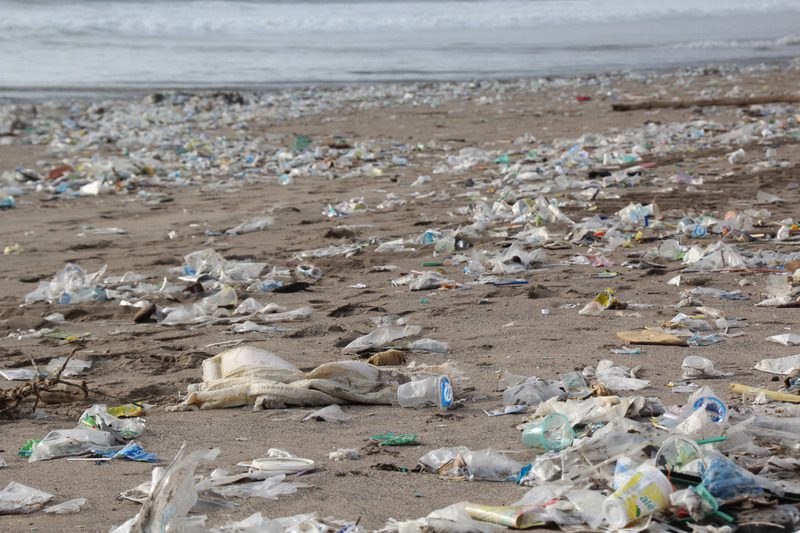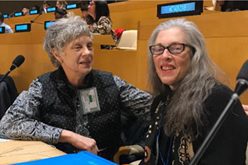
The Committee on Teaching About the United Nations has been described as the UN committee for taking action. “Our Planet—Our Crisis—What’s Next?,” the 20th annual CTAUN conference, was held on April 5th at UN headquarters in New York. Jill Tardiff, Jane Kinney-Denning and I, Marilyn Berkman, were all in attendance, and we were stirred by the calls for action and inspired by the projects involving women and youth worldwide.

Photo by: Jane Kinney-Denning
Much was said about climate change and the effects of fossil fuels, but the loudest alarms sounded were against single-use plastics. Jamil Ahmad, Director, NY Office, UN Environment Programme, delivered dire news: “More than 30 million tons of plastic waste are dumped every year.”
Fabien Cousteau — a filmmaker and ocean explorer, like his grandfather Jacques — said that because of global warming, over 500 coral reefs have been bleached. This has resulted in a loss of habitat for numerous species and possible cures for diseases. But far worse is pollution by single-use plastic. “We use the ocean as a garbage pail.” Daily, Americans use an average of eight items built to last 500 years for 30 minutes or less each. Plastic waste can now be found in the deepest parts of the ocean, disrupting endocrines in wildlife and humans, causing learning problems in children and increased rates of cancer. Nearly 50% of fish consumed have signs of microplastic in them. “You don’t even know that you are eating your garbage.” Cousteau’s Ocean Learning Center connects educators and students with communities in need of help to clean up beaches.
Eva Gartner, is an attorney for EarthJustice. She explained that chemicals and plastics derived from fossil fuels are causing gene mutations and interfering with hormones that control bodily functions, especially during pregnancy and childhood. Those in poorer countries are the most exposed, but we all are affected — even when we think we’ve safeguarded against some of these chemicals. For example, BPA is now banned but BPS likely has similar effects, such as ADD. Childhood cancer rates are rising. One cancer study “found most babies are born pre-polluted.”
The petrochemical industry is poised for explosive growth, Gartner said, There are more than 300 new plants in the US alone, many in Appalachia where previously coal mining was replaced by gas fracking. Supply of oil and gas for fuel now exceeds demand, and there is more profit in plastics and chemicals than in energy. The impact of this is greater than from coal. Texas and Louisiana form the largest petrochemical area in the Western Hemisphere, an area becoming known as Cancer Alley for the rising occurrence among workers and residents.
It was good to learn of Peace Boat, a Japan-based NGO (Non-Governmental Organization) with cruises that create a dialogue about sustainability and learning about ecological situations in each port of call. And it was good to hear from NYC-area high school students who participated in an international climate rally, COP 24 Poland 2018. The attention is now on how plastics are affecting the environment and the people of poorer and smaller countries.
But the problem with plastics starts with us in the United States and other rich countries. Not only with our use of plastics that cannot be or are not recycled, but with our exporting the waste to other countries. A recent article in the New York Times reported that there is growing backlash in Southeast Asia against importing plastic waste, which is often dumped and ends up in rivers and oceans.
Many cities in the US have instituted restrictions on plastic bags and containers. It’s a start, but we as consumers, employers and employees need to change our use. We would love to hear from WNBA-NY members about what you are doing at home and at your publishing place to restrict and recycle paper and plastic. Inspire us!
Links to more resources and videos can be found at www.teachun.org.
To read more of Marilyn’s reports from the UN, click here!





Thanks, Marilyn, for this excellent and somber report. What will it take to end plastic addiction and overuse? Thanks for helping us keep this question urgent, and reporting on these global efforts.